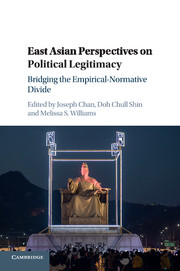Book contents
- Frontmatter
- Contents
- List of Contributors
- Preface and Acknowledgments
- 1 Political Legitimacy in East Asia: Bridging Normative and Empirical Analysis
- 2 Reasons to Obey: “Multiple Modernities” and Constructions of Political Legitimacy
- 3 Do East Asian States Enjoy a Legitimacy Premium?
- 4 Political Legitimacy in China: A Confucian Approach
- 5 Political Legitimacy in Hong Kong: A Hybrid Notion
- 6 The Evolution of Political Legitimacy in Singapore: Electoral Institutions, Governmental Performance, Moral Authority, and Meritocracy
- 7 Polarized Politics, Government Legitimacy, and Democratic Legitimacy in Taiwan
- 8 The Legitimacy of Democratic Rule in Korea: From the Perspective of the Mass Citizenry
- 9 Political Legitimacy, Satisfaction, and Japanese Democracy
- 10 Legitimacy as a Hybrid Phenomenon
- Index
9 - Political Legitimacy, Satisfaction, and Japanese Democracy
Published online by Cambridge University Press: 30 December 2016
- Frontmatter
- Contents
- List of Contributors
- Preface and Acknowledgments
- 1 Political Legitimacy in East Asia: Bridging Normative and Empirical Analysis
- 2 Reasons to Obey: “Multiple Modernities” and Constructions of Political Legitimacy
- 3 Do East Asian States Enjoy a Legitimacy Premium?
- 4 Political Legitimacy in China: A Confucian Approach
- 5 Political Legitimacy in Hong Kong: A Hybrid Notion
- 6 The Evolution of Political Legitimacy in Singapore: Electoral Institutions, Governmental Performance, Moral Authority, and Meritocracy
- 7 Polarized Politics, Government Legitimacy, and Democratic Legitimacy in Taiwan
- 8 The Legitimacy of Democratic Rule in Korea: From the Perspective of the Mass Citizenry
- 9 Political Legitimacy, Satisfaction, and Japanese Democracy
- 10 Legitimacy as a Hybrid Phenomenon
- Index
Summary
INTRODUCTION
It is easy to find reports of political dissatisfaction in Japan, both in the popular media and in academic work. Surveys routinely indicate that 80 percent or more of Japanese citizens are dissatisfied with politics, and when scholars compare Japanese public opinion toward government to the opinions held by people in other countries, they often note how Japanese attitudes are far more negative than the most natural comparators, whether they be established democracies or other East Asian countries.
And yet it is in Japan that democracy in Asia has been the most stable and has the longest history. Japanese core political institutions, even though they were in part externally imposed, have proven amazingly resilient: it is Japan that holds the record of having the longest enduring unamended democratic constitution in the world. Why is it that in the face of great political dissatisfaction, democracy in Japan has endured and even been strengthened? In this chapter, I argue that the key to understanding this apparent puzzle lies in separating out political satisfaction from political legitimacy and recognizing that even though Japanese citizens have been chronically dissatisfied with politics, they almost universally recognize the basic legitimacy of the political system. Whatever the dissatisfaction of the moment, the system has a strong basis in “input” or “process” legitimacy, even in the face of weak “output” or “performance” bases of legitimacy in recent decades. Intermittent political reforms may have done little to enhance overall levels of mass satisfaction with politics in Japan, but they have increased the responsiveness of the Japanese government to public opinion, further enhancing democratic legitimacy.
Increased legitimacy does not – and should not – necessarily lead to greater political satisfaction. Most Japanese believe that the Japanese political system should be reformed and that current politicians and political parties are doing a poor job guiding the country through tough economic, social, and political times. But an overwhelming majority of Japanese citizens believe that changes to Japanese politics should happen through the existing political structure. Japanese citizens have a commitment to democratic government, and they almost universally believe that politics are best handled through democratic means. The basic institutions of Japanese government endure, even at times when disaffection is high and the perceived efficacy of the government is low, because the people accept the legitimacy of Japanese democracy.
- Type
- Chapter
- Information
- East Asian Perspectives on Political LegitimacyBridging the Empirical-Normative Divide, pp. 218 - 237Publisher: Cambridge University PressPrint publication year: 2016



